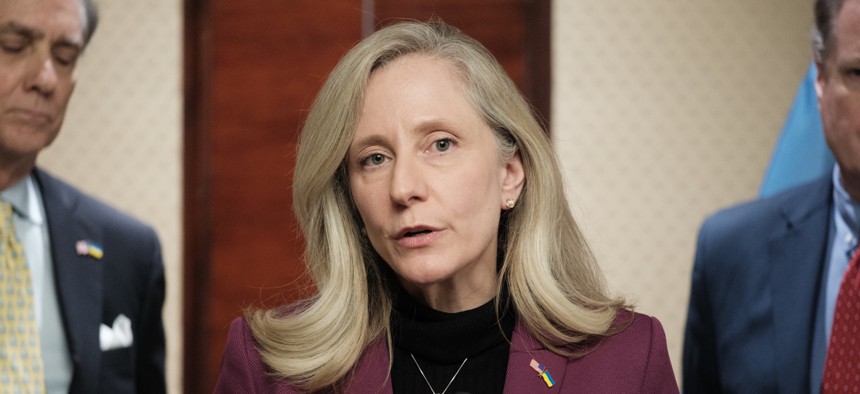
Rep. Abigail Spanberger, D-Va., consponsored legislation to create a federal grant program to build on digital workforce skills development. Global Images Ukraine / Getty Images
New bill would create federal grant program for digital upskilling
The proposed Digital Skills for Today’s Workforce Act would add digital skills training to grant programs that provide education and professional development services in an effort to boost the talent pipeline.
New legislation introduced Wednesday would seek to help narrow the nation’s digital skills gap by creating a new federal grant program to promote equity and new training opportunities.
The Digital Skills for Today’s Workforce Act — cosponsored by Reps. Abigail Spanberger, D-Va., and David Valadao, R-Calif., alongside Sen. Tim Kaine, D-Va. — would amend the 2014 Workforce Innovation and Opportunity Act to include new digital training opportunities through a grant program that can be deployed across postsecondary education, adult education and workforce development systems.
“When we help job seekers learn and refine on-the-job skills, we are helping Americans advance their careers and helping businesses hold on to adept and experienced employees,” Spanberger said in a statement. “Investments to close the digital skills gap help our workforce and our communities stay competitive and stay ahead, and I’m grateful for the support of Senator Kaine and Congressman Valadao as we work to deliver this support.”
The legislation would establish grant funding, which would be awarded by the Education and Commerce departments to states looking to expand the digital information literacy skills of qualifying residents.
The grants would apply to residents between ages 16 and 64 with indicators of low digital and information literacy skills such as education, earnings and limited English proficiency. The grants would also be geared toward those who have experienced barriers to employment or were historically underrepresented.
“Ensuring people have the digital skills they need to navigate the modern job market is critical to the strength of our economy,” said Valadao, in a statement. “When people enter the workforce with the foundational skills they need, it not only eases the burden on employers, but it sets people on a path to success for the rest of their careers."
The program would also be designed to focus on digital skills transferrable across industries and capable of adapting to “evolving technological demands, buffer workers and businesses from the disruptive effects of rapid technological shift.”
“Digital skills can be a gateway to new job opportunities for so many Virginians, especially at a time when I’m hearing from employers across the commonwealth about how hard they’re working to hire up,” Kaine said in a statement. “The Digital Skills for Today’s Workforce Act would make it easier for people to access high-quality digital training programs to develop or hone those skills.”
The bill has been referred to the House Committee on Education and the Workforce. Kaine and Spanberger introduced the legislation amid efforts by both Congress and the Office of Personnel Management to adopt more skills-based hiring practices that put lower emphasis on educational attainment and more toward competency-based certifications.







